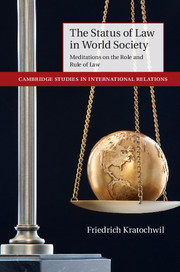Book contents
- Frontmatter
- Dedication
- Epigraph
- Contents
- Preface
- Introduction: images of law
- Meditation 1 Inter-disciplinarity, the epistemological ideal of incontrovertible foundations, and the problem of praxis
- Meditation 2 On the concept of law
- Meditation 3 On constitutions and fragmented orders
- Meditation 4 Of experts, helpers, and enthusiasts
- Meditation 5 The power of metaphors and narratives: systems, teleology, evolution, and the issue of the “global community”
- Meditation 6 Cosmopolitanism, publicity, and the emergence of a “global administrative law”
- Meditation 7 The politics of rights
- Meditation 8 The limits and burdens of rights
- Meditation 9 The bounds of (non)sense
- Index
- References
Meditation 1 - Inter-disciplinarity, the epistemological ideal of incontrovertible foundations, and the problem of praxis
Published online by Cambridge University Press: 05 June 2014
- Frontmatter
- Dedication
- Epigraph
- Contents
- Preface
- Introduction: images of law
- Meditation 1 Inter-disciplinarity, the epistemological ideal of incontrovertible foundations, and the problem of praxis
- Meditation 2 On the concept of law
- Meditation 3 On constitutions and fragmented orders
- Meditation 4 Of experts, helpers, and enthusiasts
- Meditation 5 The power of metaphors and narratives: systems, teleology, evolution, and the issue of the “global community”
- Meditation 6 Cosmopolitanism, publicity, and the emergence of a “global administrative law”
- Meditation 7 The politics of rights
- Meditation 8 The limits and burdens of rights
- Meditation 9 The bounds of (non)sense
- Index
- References
Summary
Introduction
To examine the status of law in the international arena does not seem to require any special justification. We see law everywhere, ranging from the exponentially growing number of treaties to the informal arrangements of soft law, to attempts of subjecting the actions of public and private actors to further scrutiny through a global administrative law. For some observers this represents success, as it gives the “rule of law” some further bite; for others a Foucauldian dystopia is just around the corner. Yet such an omnipresence of law might be a mixed blessing for purposes of analysis. As in the case of “power,” which is fundamental for the study of politics, the concept itself seems to have mutated from an agency-related notion, in which A makes B act in a way which he would not do otherwise (Weber), to a pervasive force penetrating all social relations. Foucault’s analysis suggested at least that much. Law seems to share the same fate. But something that we find everywhere might escape our conceptual grids, as it no longer allows us to discriminate, to distinguish.
The solution to this puzzle, we are told by traditional logic and epistemology, consists in finding the firm foundations and proper method that lead us to secure knowledge. This is what the Cartesian quest was all about, on which both the Meditations and the Discourse on Method elaborated. It was this foundation, and the Humean and Kantian challenge to it, that later resulted in the epistemology of logical positivism. In law this engagement gave rise to the project of a “pure theory of law” à la Kelsen. In the social sciences it resulted in various methodologically driven research programs of political “science” and international relations that, as academic disciplines, aspired to scientific status. Thus, both disciplines, traditionally firmly placed in the area of praxis – as they were relying on prudence rather than theoretical knowledge – had apparently, for reasons of respectability, rather gladly parted with their former moorings and now sought to satisfy the epistemological ideal.
- Type
- Chapter
- Information
- The Status of Law in World SocietyMeditations on the Role and Rule of Law, pp. 26 - 49Publisher: Cambridge University PressPrint publication year: 2014
References
- 1
- Cited by

